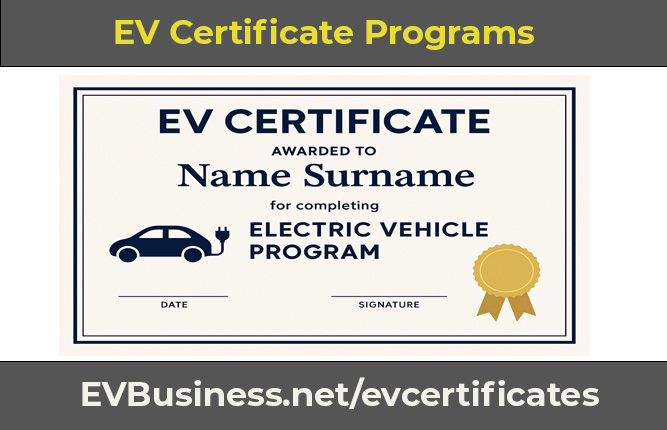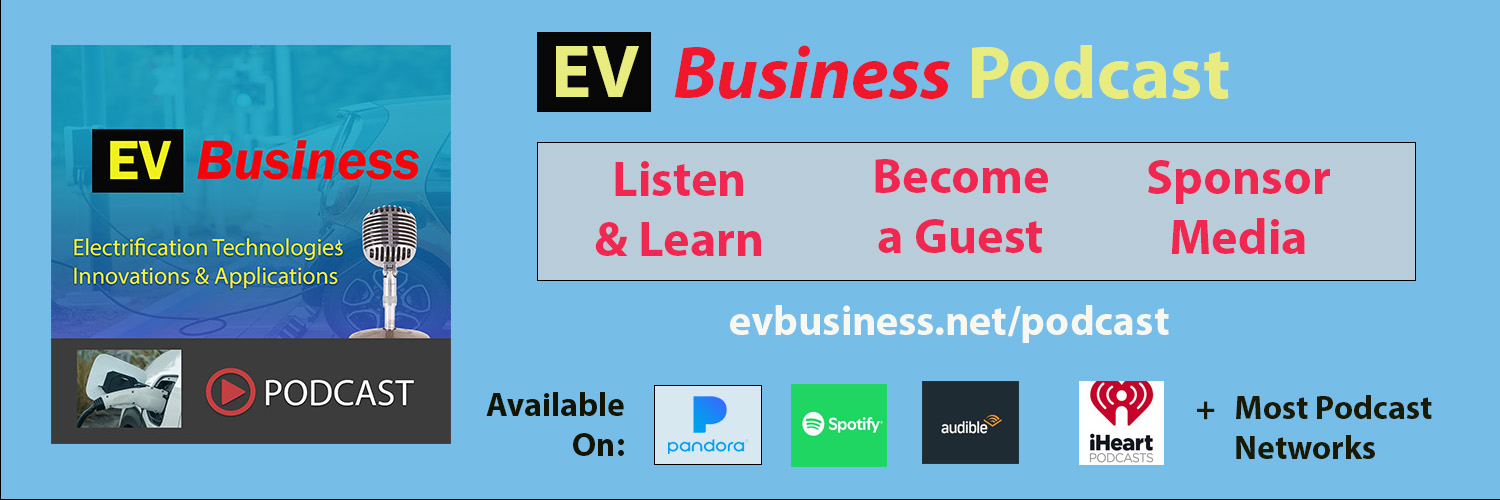EV certificate programs are run by companies and organizations to train and verify professional skills in the electric vehicle industry. Many professionals and companies struggle to find credible, flexible EV training that delivers real-world skills and career advancement. EV Certificate Programs solve this by offering industry-recognized credentials, role-based pathways, and flexible delivery options for technicians, engineers, sales teams, and fleet managers. Key features include hands-on EV tools and diagnostics training, customizable content aligned to company systems, and access to alumni networks and job placement support. Programs offer verified digital badges, multilingual content, and integration with corporate LMS platforms. Certification renewal, workforce development metrics, and available grant guidance add long-term value. EV certificate programs provide a structured, scalable way to stay competitive in the fast-growing EV industry.
Electric Vehicle – EV Industry Certificate Programs

EV Certificate Programs List
Appinventiv – Specializes in full-stack EV software & mobile app development including charger apps, fleets, and infotainment systems.
ASE – xEV Safety Certification – ASE high-voltage safety certifications guide technicians in safe EV servicing per industry standards.
Auto-ISAC – Offers online Fundamentals and Advanced Learning Tracks with examination and badge recognition.
ChargePoint University – Provides modular AC/DC EVSE technician and installer certification, microcredentials, and online exams.
Clean Tech Institute (Certified Electric Vehicle Technician – CEVT) – Delivers a CEVT training program combining theoretical lectures and practical EV tech sessions.
Connected Vehicle Trade Association (CVTA) – The CVTA facilitates the interaction, and advances the interests of entities involved in the vehicle communications industry.
Coursera (Master EV Tech: Software Skills) – Instructor-led course covering EV software architecture, diagnostic integration, and HMI system development.
DEKRA – First global cybersecurity certification program specifically for EV charging station (EVSE) vendors.
DEKRA Electric Vehicle Safety Training – Provides comprehensive EV safety training programs to equip employees with the knowledge to safely work on and around high-voltage systems.
DIYguru / eMobility Academy – Offers certification courses in EV electronics, AUTOSAR, ADAS, and software architecture suited for EV apps.
Electric Vehicle Infrastructure Training Program (EVITP) – Non-profit training for licensed electricians on EV charger (EVSE) installation and maintenance; includes certification exam.
EV Technician Training Program – Offers a self-paced, accredited certificate for EV repair, maintenance, and high-voltage system diagnostics.
Fellten EV Training – UK-based provider of online and in-person courses covering EV diagnostics, components, and repair.
George Brown College EV Technician Training – Certificate program with virtual labs and diagnostic software focusing on high-voltage EV systems.
ImmerseLearn Electric Vehicle Technician Certification – Offers comprehensive EV systems training focused on diagnostics, maintenance, repair, and optimization.
Intellias – Offers best-practice frameworks and training resources for engineering automotive applications and in-vehicle experiences.
L&T EduTech – Blends automotive cybersecurity fundamentals with EV data analytics and predictive maintenance insights.
Legacy EV (EV Fundamentals Bootcamp) – Hosts immersive bootcamps featuring high-voltage safety training, hands-on labs, and HV certification.
London School of International Business (LSIB) – Delivers a professional certificate in EV cybersecurity, including threat modeling and intrusion detection.
Meta App Designs – Produces guidelines and developer support for building robust cross-platform automotive apps.
Omnex – Offers a ISO/SAE 21434 automotive cybersecurity certification covering all clauses of the standard.
Ronas IT – Produces insights and training content on automotive app development, covering infotainment and connected services.
SAE International – Provides foundational Level‑1 automotive cybersecurity certification courses aligned with industry best practices.
SAE International – EVSE Technician Certification – SAE’s certification validates technicians on EV charger installation, commissioning, and safety according to industry standards.
Smartcar – Provides API platform and training resources for building EV-connected apps that interface with vehicle telematics.
SME (Electric Vehicle Fundamentals Certification) – Offers EVF certification aligned with Tooling U, targeting workers entering EV manufacturing and service.
TuV SUD – Advanced Level 3 training for live work on high‑voltage systems and battery safety skills.
Tata Technologies – EV Engineering Certification – Provides online engineering-focused EV certification courses covering powertrains, battery systems, and design principles.
Tonex – Courses covering embedded systems, CAN, Ethernet, and cybersecurity principles for vehicles.
Tooling – Offers nationally‑recognized EVF and EV battery assembly certifications with practical manufacturing focus.
UCSB PaCE XLRN 827 Program – Offers online + lab simulation EV Technician certification through UC Santa Barbara Extension.
UL Solutions – Comprehensive training on standards like UNECE WP.29 and ISO/SAE 21434, offering the UL-CCSP credential.
Universal Technical Institute (UTI) – Technical college with EV-focused programs developed in partnership with Bosch and Ford for high-voltage vehicle repair.
Wake Technical Community College – Offers electric vehicle training as part of its degree programs, providing state-of-the-art EV service and diagnostic equipment and professional development for faculty.
Wevolver – Hosts two-level automotive cybersecurity certification covering standards, risk, and incident response.
EV Certificate Programs Key Features and Capabilities
Alumni Support & Networking
Programs offer access to alumni communities, online forums, and networking events for certified EV professionals.
This fosters peer collaboration, career mentorship, and professional support long after certification is complete.
Certification Renewal Options
Programs include clear certification validity timelines and streamlined renewal processes to maintain up-to-date credentials.
This ensures that professionals stay current with evolving EV technologies and remain trusted by employers and clients.
Company Training Systems Integration
Certificate programs can be embedded into corporate Learning Management Systems (LMS) and talent development platforms.
This integration allows companies to standardize employee training, track progress, and align learning with internal goals.
Credentials and Badging
Graduates receive verified digital credentials and skill badges that can be shared on resumes, LinkedIn, and job platforms.
These serve as proof of expertise and increase visibility and credibility in competitive job markets.
Customizable Certificate Programs
Courses can be tailored to reflect a company’s specific tools, systems, vehicles, and compliance requirements.
Customization makes the training more relevant, improving knowledge retention and job performance.
Delivery Options
Training is offered in flexible formats such as online, in-person, and hybrid delivery modes.
This ensures accessibility for professionals with different schedules, locations, or learning preferences.
EV Tools & Software Training
Participants learn how to use EV diagnostic scanners, fleet management software, charger setup tools, and simulation apps.
Hands-on software knowledge improves job readiness and reduces learning curves in real-world roles.
Exercises and Equipment
Programs provide access to physical or virtual labs and interactive exercises for skill development.
These practical experiences are critical for reinforcing technical understanding and building confidence.
Grants and Incentives
Programs help participants identify and apply for public grants, green energy incentives, and workforce development funding.
This makes training more affordable and accessible, especially for small businesses and career changers.
Industry Recognition & Accreditation
Certifications are backed by reputable EV manufacturers, standards organizations, or regulatory bodies.
This ensures that the credentials hold value across the industry and meet professional and compliance expectations.
Instructor Credentials & Experience
Courses are taught by experienced EV professionals with recognized credentials and field expertise.
Learners benefit from real-world insights and gain trust in the training process.
Job Placement Support
Programs often include job boards, career coaching, resume assistance, and employer partnerships.
This helps participants transition from training into meaningful careers within the EV ecosystem.
Language Options
Courses are available in multiple languages to accommodate learners across global markets.
This increases inclusivity and allows diverse teams to upskill effectively.
Localization Options
Program content can be localized to reflect regional regulations, terminology, and market conditions.
This ensures relevance and compliance for international learners or multi-region organizations.
Modular Certification Levels
Programs are divided into beginner, intermediate, and advanced modules, tailored to different EV career stages.
This allows learners to progress at their own pace and supports career ladder advancement.
Pre-Assessment Tools
Initial evaluations help place learners at the appropriate starting level based on their current skills.
This ensures a more personalized learning path and avoids redundant or overly difficult material.
Role-Based Certificates
Separate certification tracks are offered for various EV roles—technicians, engineers, sales professionals, fleet operators, and planners.
Targeted tracks align training with job functions, leading to faster onboarding and better performance.
Skill-Based Testing & Assessments
Programs include practical exams, simulations, and hands-on evaluations to confirm learning outcomes.
Validated skills assessments ensure that certificate holders are job-ready and meet industry standards.
Workforce Development Metrics
Employers receive tools and dashboards to measure training ROI, employee performance improvements, and compliance.
This helps justify training investments and optimize workforce planning.
EV Certificate Programs Glossary
Alumni Support – Access to a network of certified professionals for mentorship, career advice, and peer collaboration.
Assessment Tools – Methods such as quizzes, simulations, or exams to evaluate a learner’s knowledge and skill level.
Badging (Digital Badge) – A verifiable digital icon awarded upon completion of a certificate, often shared on resumes and social profiles.
Certificate Customization – The ability to adapt course content to fit specific company systems, tools, or industry needs.
Certification Renewal – The process of updating or revalidating a certification after a set period to ensure continued compliance and relevance.
Company LMS Integration (Learning Management System) – Embedding the certificate program into an organization’s training platform for seamless tracking and management.
Credentialing Authority – An organization or entity recognized to grant certifications in the EV field, ensuring legitimacy and value.
Delivery Options – Modes of training offered, including in-person, online, or hybrid formats.
EV Tools Training – Instruction on how to use electric vehicle diagnostic tools, fleet apps, and charger software.
Grants & Incentives – Financial support opportunities to reduce training costs, especially for green tech programs or workforce development.
Industry Accreditation – Recognition from reputable EV industry organizations or regulatory bodies confirming program quality.
Instructor Certification – Credentials held by educators proving their professional and teaching qualifications in the EV sector.
Job Placement Support – Services such as resume help, job boards, or employer partnerships that help learners secure roles post-certification.
Language Support – Availability of training in multiple languages to accommodate international learners.
Localization – Adapting training content to specific regional laws, terminology, or cultural references.
Modular Certification – A structure that offers tiered certifications (beginner to advanced) for different EV job functions.
Pre-Assessment – Initial testing to evaluate a learner’s starting knowledge and place them in the appropriate learning track.
Role-Based Certificates – Certificates designed for specific positions like technician, engineer, sales rep, or fleet manager.
Software Simulations – Virtual environments that mimic real-world EV systems for practice without physical equipment.
Telematics Training – Instruction on collecting, analyzing, and using vehicle data for diagnostics and fleet performance.
Workforce ROI Metrics (Return on Investment) – Tools to track how training impacts job performance, compliance, and company goals.

